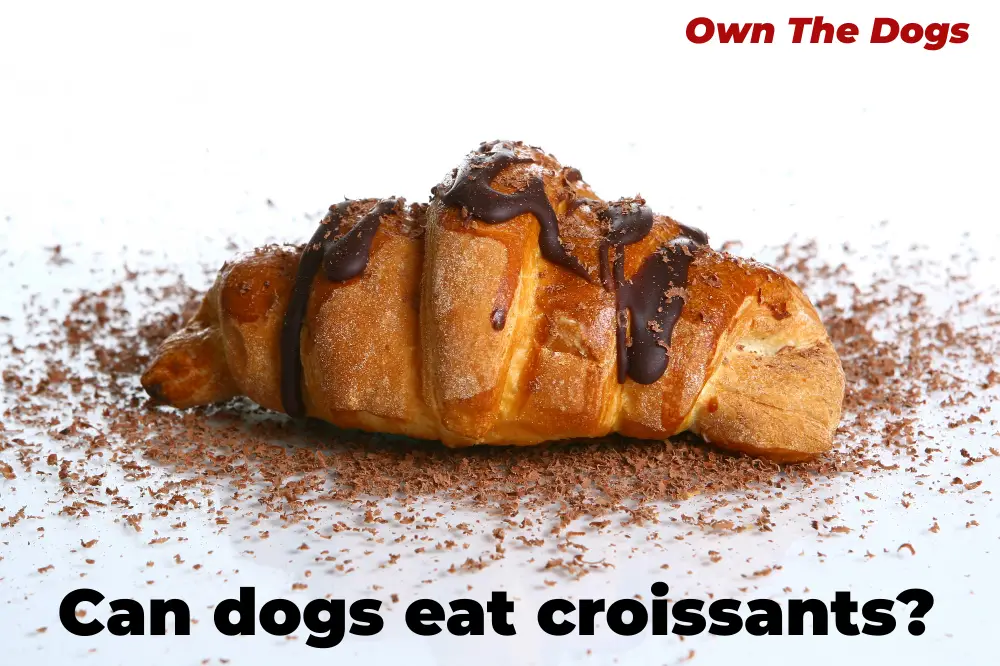We’ve all been there: enjoying a crisp, buttery croissant and suddenly those puppy eyes are on you, asking for a bite. But is it okay to share a piece with our furry friends? Let’s unwrap the mystery of whether can dogs eat croissants? croissants are safe for dogs to eat or not?
Can Dogs Eat Croissants? The Quick Answer
Not really. A small piece might not hurt once in a while, but it’s not a good treat for them. Croissants have butter, sugar, and sometimes stuff that’s not good for dogs.
What to Do If Your Dog Eats a Croissant?
Immediate Steps to Take
First and foremost, don’t panic. A small piece of plain croissant isn’t likely to harm your dog. However, determine how much and what type of croissant was eaten. If it had potentially harmful fillings like chocolate or raisins, you’d want to consult your vet immediately. Keep an eye on your dog and look for any signs of discomfort or unusual behavior. When in doubt, always reach out to a veterinarian for guidance.
What Happens If My Dog Eats a Croissant?
Potential Side Effects
While a bite or two might not be harmful, excessive consumption can lead to health issues. The high fat and butter content can lead to an upset stomach, including diarrhea and vomiting. Some dogs might also show signs of lethargy. As mentioned earlier, croissants with harmful fillings pose the most significant risk, leading to potential toxicity or allergic reactions. Continuous feeding of such treats can also lead to long-term health issues like obesity.
Nutrition Chart: Croissants Calorie Count for Dogs
| Item | Calorie Count | Impact on Dogs |
|---|---|---|
| Croissant (Regular, 57g) | ||
| Calories | ~231 kcal | Significant: For a 10-pound dog, this is about 25% of their daily calorie requirement. |
| Fat | ~12g | High: Can lead to obesity and pancreatitis in dogs if consumed regularly. |
| Carbohydrates | ~25g | Moderate: Dogs can metabolize carbs but they should primarily have a protein-based diet. |
| Protein | ~5g | Low: Dogs benefit from protein but this amount is minimal in their daily requirement. |
Special Croissants:
| Item | Calorie Count | Impact on Dogs |
|---|---|---|
| Chocolate Croissant | ~300 kcal | Highly dangerous: Not only is the calorie count high, but chocolate is toxic to dogs and can be life-threatening. |
Keep in mind that while croissants might be delicious, they’re not the most nutritious or safe choice for dogs, especially special variations like chocolate croissants. The high-calorie content combined with the unhealthy fats and potential for harmful ingredients means it’s best to give your dog specially formulated dog treats instead.
10 Healthy Alternatives to Croissants
Treats Your Dog Will Love
- Carrots: Crunchy and full of vitamins.
- Blueberries: Packed with antioxidants.
- Apple Slices: Remove the seeds first.
- Cucumber Slices: A hydrating treat.
- Sweet Potato: Cooked, not raw.
- Lean Meat: Cooked chicken or turkey without any added seasonings.
- Rice Cakes: Plain, without any toppings.
- Green Beans: A low-calorie snack.
- Watermelon: Seedless and in moderation.
- Pumpkin Puree: Great for digestion.
How Can I Make My Dog Stop From Eating Croissants?
Prevention Tips
Dogs are naturally curious and often motivated by food. The key is training and management. Start by ensuring that food is kept out of your dog’s reach. If your dog is highly food-driven, consider investing time in training commands like “leave it” or “drop it.” Offer healthier treats or toys to distract them from tempting foods. Being consistent in your reactions and commands is vital. The more you reinforce good behavior, the better your dog will understand what’s off-limits.
Why Are Croissants Not Ideal for Dogs?
Let’s understand the ingredients
While the occasional croissant nibble isn’t a disaster, understanding the pastry’s makeup helps. They contain butter, salt, and sometimes even sweet fillings or toppings. All these ingredients, especially in large quantities, aren’t dog-friendly.
Potential Risks of Croissants with Fillings
Not all croissants are plain
Many croissants come with chocolate, raisins, or nuts. Chocolate is toxic for dogs, raisins can cause kidney failure, and some nuts, like macadamias, are harmful. It’s crucial to know what’s inside that pastry!
The Calorie Count: Dogs vs. Humans
Do they need those extra calories?
Croissants are high in calories. Unlike humans, dogs need fewer calories daily. Feeding them calorie-rich treats can lead to weight gain and related health issues.
Allergic Reactions and Food Sensitivities in Dogs
Every dog is different
Just as humans can be allergic or sensitive to certain foods, so can dogs. Ingredients in croissants might trigger unexpected allergic reactions in some dogs.
A Look at Alternative Pastries and Breads
Are any of them dog-friendly?
From bagels to muffins, which baked goods (if any) are safe? A comparative look at common bakery items and their potential effects on dogs.
Conclusion
Croissants might make our breakfasts delightful, but they aren’t the ideal snack for our furry friends. Their tempting layers of butter and flour might give us that morning pick-me-up, but for our dogs, it’s a different story. From potential risks with flavored croissants to the sheer calorie overload, it’s best to keep these tasty pastries on our plates and away from our pups. After all, there are plenty of dog-friendly treats out there that are both safe and delicious! So, the next time you’re munching on a croissant, just remember – it’s best enjoyed by humans.
Frequently Asked Questions
Can Dogs Eat Butter Croissants?
While not toxic, butter croissants are high in fats which aren’t ideal for dogs. Occasional small pieces are okay, but it’s not recommended as a regular treat.
Can Dogs Eat Almond Croissants?
No. Almond croissants may contain actual almonds, which are not recommended for dogs. Additionally, artificial almond flavoring can be harmful.
Can Dogs Eat Chocolate Croissants?
Absolutely not. Chocolate is toxic to dogs and can be life-threatening.
Is it safe to feed my dog a croissant?
While a small amount of plain croissant isn’t immediately harmful, due to its high-fat content and lack of nutritional value, it’s best avoided.
Is pastry OK for dogs?
Pastries are often high in sugar and fat, making them unhealthy for dogs. They should not be a part of a dog’s regular diet.
Can dogs eat bread?
In moderation, plain bread without any additives or spices is safe for most dogs. However, it shouldn’t replace their regular diet.


